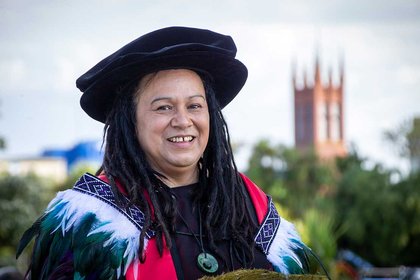
Dr Paulē Ruwhiu recently graduated with a PhD from Massey University.
A Massey University researcher is calling for social work education in Aotearoa New Zealand to be decolonised. Social work lecturer Dr Paulè Ruwhiu, Ngāpuhi, Ngāti Porou, has just completed her PhD research into the process of decolonisation and the experiences of Māori social workers and Māori social work students.
Dr Ruwhiu says current programmes focus on western models, with Māori content as a curriculum add-on. “I’ve got no problems teaching the western models, but I do have a problem when I can’t see my own culture in the courses delivered, particularly when social workers will go out to communities where the service users are mainly Māori and Pasifika.”
She would like to see decolonisation topics, such as historical discourses, racism, privilege and cultural dominance, feature in degree courses so students can be aware of their own cultural positioning and how it affects the way they work with clients. She would also like to encourage Māori models of practice, Māori principles and experiential learning through noho marae.
“What I found is that we are too busy talking about the impacts of colonisation, which creates a deficit focus for Māori as the oppressed, with an emphasis on how Māori can work with Pākehā, not the other way around.”
She says Pākehā also need to face themselves and work through what their obligations and responsibilities are in Aotearoa New Zealand under te Tiriti o Waitangi.
“You need to know who you are before you work with others – that’s our social work mantra. You’ve got to be comfortable in who you are.”
The importance of identity is something Dr Ruwhiu knows first-hand. It was when she came to study at Massey University that she started to explore her own Māori heritage. She saw a lot of self-identity issues with tangata whaiora (clients) when working in Māori mental health and then, as a lecturer, found many students were disconnected from their culture.
A decolonisation process for students is the first in a three-tier change framework Dr Ruwhiu has developed in her thesis. The second tier is around education and practice in social work so that western and tangata whenua or indigenous models work together in a parallel curriculum. The third focuses on policy and lays a challenge to the Social Workers Registration Board. “We need to have the registration board as role models in leading decolonisation frameworks within our profession,” she says.
The current process to be registered as a social worker in Aotearoa New Zealand requires a written application proving you understand three Māori principles, but Dr Ruwhiu says this is not a tangata whenua process.
“We’re face-to-face people, so writing on a piece of paper, ‘This is how I work with tangata whenua’, is not a fair process for everyone. A fair process requires a kanohi ki te kanohi [face to face] situation.”
She says recent challenges to Oranga Tamariki indicate Māori are no longer prepared to accept the status quo and she believes the process of decolonisation needs to be a central tenet in the social work profession to move forward in Aotearoa New Zealand.
Head of Massey University’s Social Work School Associate Professor Kieran O’Donoghue says Dr Ruwhiu’s work will provide much-needed guidance for training future generations.
“The decolonisation process for Māori social workers and Māori social work students developed by Dr Ruwhiu is an outstanding and needed contribution for indigenous social work internationally. It also provides a map for the transformation of the social work profession and how we educate social workers in Aotearoa New Zealand over the next decade.”